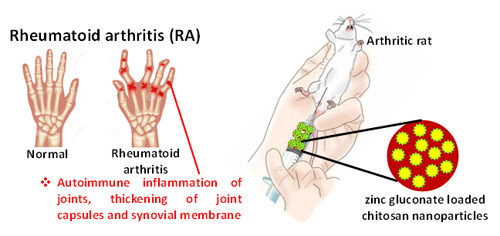 Scientists from the Institute of Nano Science & Technology (INST), Mohali, an autonomous institute of the Department of Science and Technology Government of India, have formulated nanoparticles with chitosan and loaded these nanoparticles with zinc gluconate for reducing the severity of rheumatoid arthritis.
Scientists from the Institute of Nano Science & Technology (INST), Mohali, an autonomous institute of the Department of Science and Technology Government of India, have formulated nanoparticles with chitosan and loaded these nanoparticles with zinc gluconate for reducing the severity of rheumatoid arthritis.Element Zinc is vital for maintaining normal bone homeostasis, and its levels are reported to get reduced in rheumatoid arthritis patients and arthritis-induced animals. It is also known that oral supplementation of zinc in the form of zinc gluconate have very low bioavailability in humans.
Chitosan, the biocompatible, biodegradable natural polysaccharide that is one of the most abundant biopolymers obtained from the exoskeleton of crustaceans have shown absorption promoting characteristics. The INST team have particularly chosen chitosan as it is biodegradable, biocompatible, non-toxic, and mucoadhesive in nature. A previously published report in the journal ‘Magnesium Research’ exhibited that after intraperitoneal administration in rats, zinc oxide in standard form resulted in a slight increase in serum zinc level, whereas that in nano form resulted in significantly high serum zinc levels thus increasing the zinc bioavailability. This motivated the INST team to develop the nanoformulation of zinc gluconate.
In the recent past, ionic gelation method has been widely employed for formulating chitosan nanoparticles, which may contain various medicinally active pharmacological agents. The DST-Science and Engineering Research Board (SERB) and DST-Nanomission supported study led by Dr. Rehan Khan, published in ACS Biomaterials Science and Engineering journal has analyzed the superior efficacy of zinc gluconate-loaded chitosan nanoparticles over the free form of zinc gluconate.
The team prepared Zinc gluconate loaded chitosan nanoparticles using chitosan and sodium tripolyphosphate in double-distilled water, and zinc gluconate was simultaneously added along with the synthesis of chitosan nanoparticles. Nanoparticles were characterized for various physicochemical properties, and then anti-arthritic potential was investigated against collagen-induced arthritis in Wistar rats. They observed that the treatment of rats with both zinc gluconate and zinc gluconate loaded chitosan nanoparticles reduced the severity of arthritis by reducing joint swelling, erythema, and edema but zinc gluconate loaded nanoparticles exhibited superior efficacy. The team assessed various parameters like biochemical analysis, histological observations, and immunohistochemical expression of inflammatory markers and suggested that zinc gluconate-loaded chitosan nanoparticles exerted superior therapeutic effects compared to the free form of zinc gluconate. This they attributed due to the inflammatory potential of zinc gluconate-loaded chitosan nanoparticles.
“Nanobiotechnology provides several effective solutions for the problems that traditional pharmaceutical formulations are often not able to address as effectively, such as sustained and targeted release of drugs, bioavailability, and efficacy of drugs and nutraceuticals, etc. The nanoformulation of zinc gluconate-loaded chitosan nanoparticles developed at INST Mohali is a creative example of a superior therapeutics for rheumatoid arthritis,” said Prof Ashutosh Sharma, Secretary, DST.
Publication:
Ansari MM, Ahmad A, Mishra RK, Raza SS, Khan R. Zinc gluconate-loaded chitosan nanoparticles reduce the severity of collagen-induced arthritis in Wistar rats. ACS Biomaterials Science & Engineering. 2019 May 27; 5 (7): 3380-3397.
Ansari MM, Ahmad A, Mishra RK, Raza SS, Khan R. Zinc gluconate-loaded chitosan nanoparticles reduce the severity of collagen-induced arthritis in Wistar rats. ACS Biomaterials Science & Engineering. 2019 May 27; 5 (7): 3380-3397.
For more details contact Dr. Rehan Khan (rehankhan[at]inst[dot]ac[dot]in,0172 – 2210075)






























